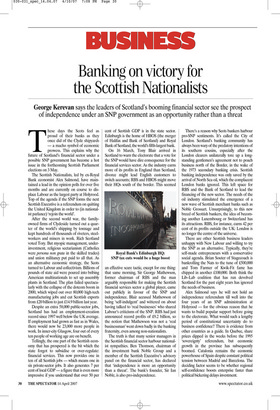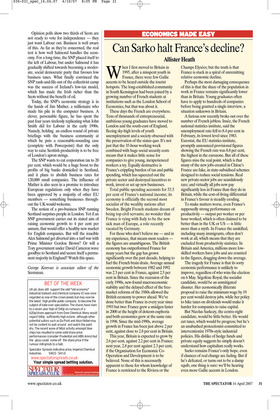BUSINESS
Banking on victory for the Scottish Nationalists
George Kerevan says the leaders of Scotland’s booming financial sector see the prospect
of independence under an SNP government as an opportunity rather than a threat
These days the Scots feel as proud of their banks as they once did of the Clyde shipyards — a macho symbol of economic prowess. This explains why the future of Scotland’s financial sector under a possible SNP government has become a hot issue in the forthcoming Scottish Parliament elections on 3 May.
The Scottish Nationalists, led by ex-Royal Bank economist Alex Salmond, have maintained a lead in the opinion polls for over five months and are currently on course to displace Labour as the largest party at Holyrood. Top of the agenda if the SNP forms the next Scottish Executive is a referendum on quitting the United Kingdom in order to (in nationalist parlance) ‘rejoin the world’.
After the second world war, the familyowned firms of Clydeside turned out a quarter of the world’s shipping by tonnage and kept hundreds of thousands of riveters, steelworkers and miners in work. Rich Scotland voted Tory. But myopic management, underinvestment, religious sectarianism (Catholics were persona non grata in the skilled trades) and union militancy put paid to all that. As an alternative economic strategy, the Scots turned to Labour and collectivism. Billions of pounds of state aid were poured into bribing American multinationals to set up assembly plants in Scotland. The plan failed spectacularly with the collapse of the dotcom boom in 2000, which wiped out over 80,000 high-tech manufacturing jobs and cut Scottish exports from £20 billion to just £14.9 billion last year.
Despite an extra 58,000 public-sector jobs, Scotland has had an employment-creation record since 1997 well below the UK average. If employment had grown as fast as in Wales, there would now be 23,000 more people in work. In inner-city Glasgow, four out of every ten people of working age are on benefit.
Tellingly, the one part of the Scottish economy that has prospered is the bit which the state forgot to subsidise or over-regulate: financial services. This now provides one in ten of all Scottish jobs — which means one in six private-sector jobs. It also generates 7 per cent of local GDP — a figure that is even more impressive if you understand that over 50 per cent of Scottish GDP is in the state sector. Edinburgh is the home of HBOS (the merger of Halifax and Bank of Scotland) and Royal Bank of Scotland, the world’s fifth-largest bank.
On 16 March, Tony Blair arrived in Scotland to warn the electorate that a vote for the SNP would have dire consequence for the financial services sector. As the industry earns more of its profits in England than Scotland, divorce might lead English customers to switch accounts; RBS and HBOS might move their HQs south of the border. This seemed an effective scare tactic, except for one thing: that same morning, Sir George Mathewson, former chairman of RBS and the man arguably responsible for making the Scottish financial services sector a global player, came out publicly in favour of the SNP and independence. Blair accused Mathewson of being ‘self-indulgent’ and wittered on about having talked to ‘real businesses’ who shared Labour’s criticisms of the SNP. RBS had just announced record profits of £9.2 billion, so the notion that Mathewson was not a ‘real businessman’ went down badly in the banking fraternity, even among non-nationalists.
The truth is that many senior managers in the Scottish financial sector harbour nationalist sympathies. Ben Thomson, chairman of the investment bank Noble Group and a member of the Scottish Executive’s advisory panel on the financial sector, has declared that ‘independence is more an opportunity than a threat’. The bank’s founder, Sir Ian Noble, is also pro-independence. There’s a reason why Scots bankers harbour pro-SNP sentiments. It’s called the City of London. Scotland’s banking community has always been wary of the predatory intentions of its southern cousins, especially after the London clearers unilaterally tore up a longstanding gentlemen’s agreement not to poach business north of the Border, in the wake of the 1973 secondary banking crisis. Scottish banking independence was only saved by the arrival of North Sea oil, which the complacent London banks ignored. This left space for RBS and the Bank of Scotland to lead the financing of the new sector. The needs of the oil industry stimulated the emergence of a new wave of Scottish merchant banks such as Noble Grossart. Unsurprisingly, to this new breed of Scottish bankers, the idea of becoming another Luxembourg or Switzerland has its attractions. RBS, for instance, earns 42 per cent of its profits outside the UK: London is no longer the centre of the universe.
There are other Scottish business leaders unhappy with New Labour and willing to try the SNP as an alternative. Typically, they’re self-made entrepreneurs with a conservative social agenda. Brian Souter of Stagecoach is bankrolling the Nats to the tune of £500,000 and Tom Farmer of Kwik-Fit fame has chipped in another £100,000. Both think the Lib–Lab coalition that has run devolved Scotland for the past eight years has ignored the needs of business.
Alex Salmond says he will not hold an independence referendum till well into the four years of an SNP administration at Holyrood — for the obvious reason that he wants to build popular support before going to the electorate. What would such a lengthy period of constitutional uncertainty do to business confidence? There is evidence from other countries as a guide. In Quebec, share prices dipped in the weeks before the 1995 ‘sovereignty’ referendum, but economic growth in the province has subsequently boomed. Catalonia remains the economic powerhouse of Spain despite constant political tension between Madrid and Barcelona. The deciding factor seems to be whether regional self-confidence boosts enterprise faster than political bickering delays investment. Opinion polls show two thirds of Scots are not ready to vote for independence — they just want Labour out. Business is well aware of this. As far as they’re concerned, the real test is how well Salmond handles the economy. For a long time, the SNP placed itself to the left of Labour, but under Salmond it has gradually shifted towards becoming a moderate, social democratic party that favours low business taxes. What finally convinced the SNP rank-and-file out of the collectivist camp was the success of Ireland’s low-tax model, which has made the Irish richer than the Scots without the benefit of oil.
Today, the SNP’s economic strategy is in the hands of Jim Mather, a millionaire who made his pile in the computer business. A clever, personable figure, he has spent the past four years tirelessly replicating what John Smith did for Labour in the early 1990s. Namely, holding an endless round of private briefings with the business community at which he puts a reasonable-sounding case (complete with Powerpoint) that the only way to raise Scottish productivity is to be free of London’s apron strings.
The SNP wants to cut corporation tax to 20 per cent, which would be a huge boost to the profits of big banks domiciled in Scotland, and it plans to abolish business rates for 120,000 small companies. The influence of Mather is also seen in a promise to introduce European regulations only when they have been approved by a majority of other EU members — something businesses throughout the UK would welcome.
The notion of a pro-business SNP running Scotland surprises people in London. Yet if an SNP government carries out its stated aim of raising economic growth to 4 per cent per annum, that would offer a healthy new market for English companies. But will the irascible Alex Salmond get diverted into a turf war with Prime Minister Gordon Brown? Or will a Tory government under David Cameron wave goodbye to Scotland and secure itself a permanent majority in England? Watch this space.



































































 Previous page
Previous page